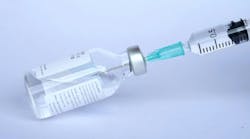Combining the anticancer drugs enfortumab vedotin and pembrolizumab (EV+P) led to significantly improved survival rates among patients with advanced urothelial cancer (the most common type of bladder cancer) compared with standard chemotherapy, according to results of a large international clinical trial involving 185 sites, including the Johns Hopkins Kimmel Cancer Center’s Greenberg Bladder Cancer Institute, in 25 countries.
Results of the EV-302/KEYNOTE-A39 study, published March 7 in the New England Journal of Medicine, demonstrated that the two-drug EV+P combination led to nearly doubled rates of overall survival (OS) and progression-free survival (PFS), the length of time during which a patient’s cancer does not worsen, compared with standard chemotherapy. About 17 months following the start of treatment, the median OS was 31.5 months for those who received the EV+P combination therapy compared with 16.1 months for those receiving standard chemotherapy. The median PFS was 12.5 months for those on the combination therapy compared with 6.3 months for those receiving chemotherapy.
During the study, patients were randomly assigned to receive three-week cycles of enfortumab vedotin (1.25 milligrams per kilogram intravenously on Day 1 and Day 8) plus pembrolizumab (200 milligrams intravenously on Day 1), or standard platinum-based chemotherapy. Of 886 patients randomized, 442 received the novel combination therapy and 444 received chemotherapy. The median age of patients was 69; nearly 77% were male.
Enfortumab vedotin is an antibody-drug conjugate, in which an anticancer drug is attached to a monoclonal antibody that seeks out cancer cells. When it finds cancer cells, it binds to a protein on the surface of the cells and directs the cancer-killing drug inside, sparing nearby tissue. Pembrolizumab, a PD-1 inhibitor, is a type of immunotherapy that rallies the body’s immune system to fight cancer.
Based on the study results, which were first presented last October at the 2023 European Society of Medical Oncology Annual Congress in Spain, the U.S. Food and Drug Administration gave full approval to the combination therapy for treatment of urothelial cancers as of Dec. 15, 2023.





